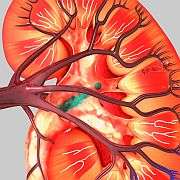(HealthDay)—Patients with small renal masses who have a radical nephrectomy are significantly more likely to experience up staging to a more advanced chronic kidney disease stage based on glomerular filtration rate ranges, compared to those undergoing partial nephrectomy, active surveillance, or cryoablation, according to a study published in the October issue of The Journal of Urology.
Matthew R. Danzig, M.D., from the Columbia University College of Physicians and Surgeons in New York City, and colleagues compared renal function outcomes among patients in the surveillance (68 participants) and intervention (65 participants undergoing partial nephrectomy, 15 undergoing radical nephrectomy, and 14 undergoing cryoablation) arms of the Delayed Intervention and Surveillance for Small Renal Masses registry.
The researchers found that mean estimated glomerular filtration rate change was significantly larger for radical nephrectomy compared to surveillance, and for radical compared to partial nephrectomy (P = 0.001). There were no other significant group differences. Patients undergoing radical nephrectomy had significantly worse chronic kidney disease up staging-free survival compared to those treated with partial nephrectomy (P = 0.029), surveillance (P = 0.007), and cryoablation (P = 0.019). On multivariate analysis, radical nephrectomy independently predicted poor chronic kidney disease up staging-free survival (odds ratio versus surveillance, 30.6; P = 0.001).
"In certain patients with small renal masses, surveillance and partial nephrectomy may offer comparable renal functional outcomes," the authors write.
One author disclosed financial ties to the pharmaceutical industry.
More information:
Abstract
Full Text (subscription or payment may be required)
Editorial (subscription or payment may be required)
Journal information: Journal of Urology
Copyright © 2015 HealthDay. All rights reserved.



















